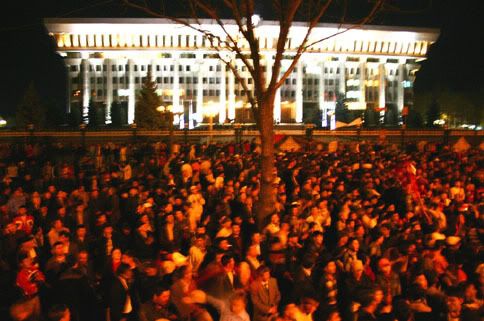Kyrgyz “Maydan,” the Sequel (Part 6): Have Bakiyev and Kulov Backed Themselves into a Corner?


Protesters on the streets of central Bishkek on Monday (courtesy of KyrgyzReport)
As promised, Monday was a critical day in the standoff between the government and opposition protestors in Bishkek. It began with Bakiyev presenting his version of the constitution to the parliament, which is overtly pro-presidential in form. This move was not only boycotted by pro-opposition deputies, but even the speaker of the parliament (usually seen as moderate if not pro-Bakiyev), Marat Sulantov, was unsatified with Bakiyev’s proposal. Sultanov said that in response the parliament would be presenting its own alternative version of the constitution for consideration, which would serve as a compromise between the positions of the president and the protestors.
Furthermore, according to deputy Temir Sariyev, this compromise version of the constitution will be discussed overnight at parliament starting at 10:00 pm. Sariyev has also been cited as stating that there will be a “constitutional change of the government” in the next two days, suggesting that the opposition deputies may have a specific plan in mind. At about 10:30 pm, Akipress reports that deputies are arriving at parliament, but they have yet to begin the session. Akipress also reports that a large group of protesters has moved from the Alatoo square to the parliament and will await the outcome of parliamentary discussions overnight. The parliament building is apparently surrounded by police as deputies hope to get the 51 deputy quorum it needs to adopt a new constitution. If they succeed, Melis Eshimkanov says that the parliament will declare the dissolution of the government and announce the formation of a new one tonight. While Bakiyev has not been invited to the parliamentary session, Kulov apparently has been invited so that he could resign before parliament.
In the meantime, there are reports rampant that various officials are defecting to the opposition. And, in a move reminiscent of Askar Akayev’s last days, Bakiyev replaced his minister of internal affairs late in the day. It would appear that the Bakiyev-Kulov tandem is backed into a corner as the course of political events turns against them. Still, it is too early to tell for sure. Afterall, the parliament still needs 51 deputies and, as of 10:44, they only had 38 to 42 deputies present while 20-some deputies are at the home of deputy Popov and are refusing to attend the session. One thing is for sure…it is likely to be a long night in Bishkek. And, tomorrow is the 89th anniversary of the Bolshevik revolution…
NOTE:
If you read Russian, Akipress is the best source for up-to-date information on developments in Bishkek. Unfortunately, its site has been overloaded since Friday and has not been available to people outside of Kyrgyzstan. Luckily, Akipress has found a creative way to allow people outside of Kyrgyzstan to access its site—they opened a blog version of the their newsite on LiveJournal…you can find it HERE.
In English, the KyrgyzReport also provides periodic updates on the situation in Bishkek with photos.
Finally, if you want to see a frequently refreshed webcam of areas in Bishkek (now focused on the area in front of the white house), you can find that HERE



2 Comments:
Kulov may pay the biggest price for all this. He had the support of the opposition and the chance to resign, yet he threw it all away to back one of the most mediocre President's in Asian political history. Im sure he will regret this for years to come.
This news about the 20 deputies refusing to attend concerns me. I think we could be in for a much more tense political stand-off -even if reforms are passed- than we saw during the Tulip Revolution
Matt,
I agree that the situation is potentially quite tense. I haven't mentioned it in any of my posts yet, but yesterday afternoon in Kyrgyzstan, it was also leaked that the government was actively involved in telling budget employees to be ready to participate in a counter-protest against the opposition. If the government succeeds in mobilizing people to confront the protests, there is certainly potential for violence, especially if somebody decided to provoke it (which is a well tested strategy of the KGB's successor agencies around the former USSR).
Post a Comment
<< Home